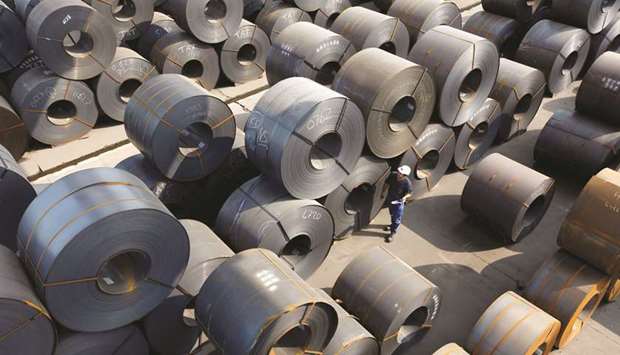Turkish steel has been all but shut out from the US after President Donald Trump doubled tariffs. But as the rest of the world braces to receive the banished metal, there’s some good news: Global demand is booming, and Turkish steel is more attractive than ever.
There’s more demand for steel as China reduces exports and closes polluting plants. The world’s biggest steel producer could even face shortages if the country shutters more plants this winter, Societe Generale SA analyst Christian Georges said in a note last month.
“Global demand is strong enough that it can serve as a mitigating factor, offsetting Turkish volatility,” said Seth Rosenfeld, an analyst at Jefferies International. “There’s enough demand that these dislocations can be absorbed elsewhere.”
Turkish steel exports have been booming this year. The world’s sixth-biggest producer shipped $8.4bn of the metal in the first seven months of 2018, a 27% increase from a year earlier. It’s on course to easily exceed the $11.5bn it shipped in 2017.
Last year the US was the biggest buyer, followed by Israel and Italy. This year, however, exports to the US have more than halved to about 500,000 metric tonnes in the year to May because of earlier tariffs. Italy and Spain have gained as preferred destinations.
Ever since the global financial crisis, the steel industry has creaked under the weight of too much supply. The struggles of steelmakers have become a flashpoint from Washington to Brussels as politicians position themselves to protect their local industries.
Among them, Trump has been the most zealous, first imposing 25% duties on all foreign steel, and then declaring a special 50% tariff on the metal from Turkey. The move, announced on August 10, is meant to add pressure on President Recep Tayyip Erdogan to free an American pastor accused of aiding an attempted coup against him two years ago.
With the US and Europe becoming increasingly protectionist, there are fewer markets open to steel exporters. “The available market universe is shrinking due to trade barriers and wars,’’ said Kirill Chuyko, a strategist at BCS Global Markets in Moscow.
The EU has implemented so-called safeguarding measures, where tariffs of 25% are added to volumes that exceed historical averages. That means rather than flooding the region with steel once destined for the US, Turkey will have to take market share away from existing suppliers, chiefly Russia and China.
Turkey’s recent tribulations give its producers an edge. The lira has lost almost two-thirds of its value since the start of the year, reducing the cost of Turkish steel, although raw material costs are in dollars.
“European safeguard measures should be sufficient to dissuade a surge in imports, but within that quota, various countries such as Turkey, India, China and Russia can compete for market share,” said Rosenfeld. “With current currency tailwinds, Turkey may be able to take more share because it has a more competitive cost base.”

A worker checks coils of steel at Turkish steel manufacturer ISDEMIR in Iskenderun in Hatay province (file). Turkish steel exports have been booming this year.
